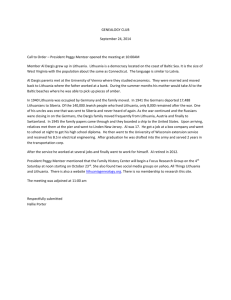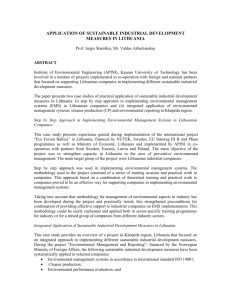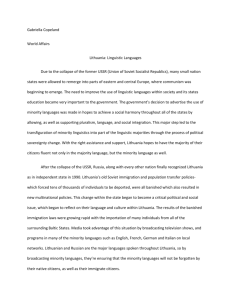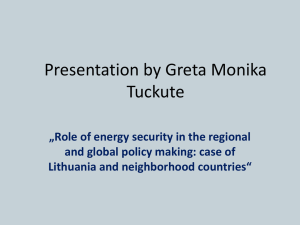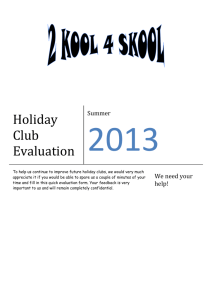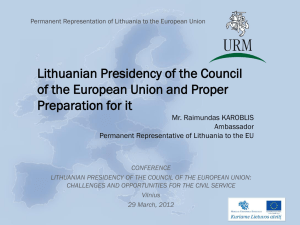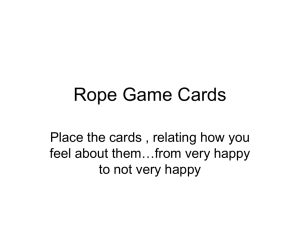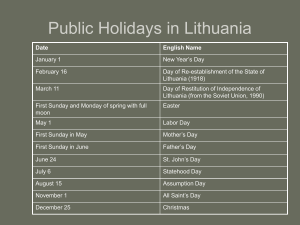Rural tourism in Lithuania - EEDAN - English Education Despite All
advertisement
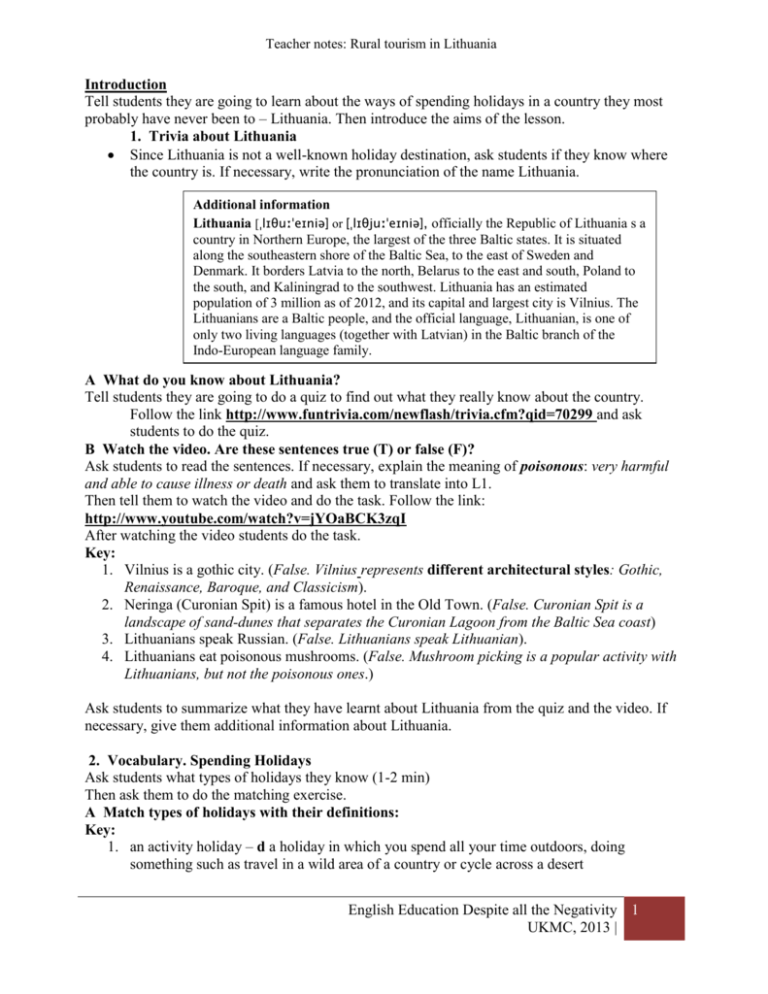
Teacher notes: Rural tourism in Lithuania Introduction Tell students they are going to learn about the ways of spending holidays in a country they most probably have never been to – Lithuania. Then introduce the aims of the lesson. 1. Trivia about Lithuania Since Lithuania is not a well-known holiday destination, ask students if they know where the country is. If necessary, write the pronunciation of the name Lithuania. Additional information Lithuania [ˌlɪθuːˈeɪniə] or [ˌlɪθjuːˈeɪniə], officially the Republic of Lithuania s a country in Northern Europe, the largest of the three Baltic states. It is situated along the southeastern shore of the Baltic Sea, to the east of Sweden and Denmark. It borders Latvia to the north, Belarus to the east and south, Poland to the south, and Kaliningrad to the southwest. Lithuania has an estimated population of 3 million as of 2012, and its capital and largest city is Vilnius. The Lithuanians are a Baltic people, and the official language, Lithuanian, is one of only two living languages (together with Latvian) in the Baltic branch of the Indo-European language family. A What do you know about Lithuania? Tell students they are going to do a quiz to find out what they really know about the country. Follow the link http://www.funtrivia.com/newflash/trivia.cfm?qid=70299 and ask students to do the quiz. B Watch the video. Are these sentences true (T) or false (F)? Ask students to read the sentences. If necessary, explain the meaning of poisonous: very harmful and able to cause illness or death and ask them to translate into L1. Then tell them to watch the video and do the task. Follow the link: http://www.youtube.com/watch?v=jYOaBCK3zqI After watching the video students do the task. Key: 1. Vilnius is a gothic city. (False. Vilnius represents different architectural styles: Gothic, Renaissance, Baroque, and Classicism). 2. Neringa (Curonian Spit) is a famous hotel in the Old Town. (False. Curonian Spit is a landscape of sand-dunes that separates the Curonian Lagoon from the Baltic Sea coast) 3. Lithuanians speak Russian. (False. Lithuanians speak Lithuanian). 4. Lithuanians eat poisonous mushrooms. (False. Mushroom picking is a popular activity with Lithuanians, but not the poisonous ones.) Ask students to summarize what they have learnt about Lithuania from the quiz and the video. If necessary, give them additional information about Lithuania. 2. Vocabulary. Spending Holidays Ask students what types of holidays they know (1-2 min) Then ask them to do the matching exercise. A Match types of holidays with their definitions: Key: 1. an activity holiday – d a holiday in which you spend all your time outdoors, doing something such as travel in a wild area of a country or cycle across a desert English Education Despite all the Negativity 1 UKMC, 2013 | Teacher notes: Rural tourism in Lithuania 2. a camping holiday - g the activity of taking a holiday in which you stay in a tent 3. a caravan holiday - i a holiday in which you take a caravan with you and sleep in it while you are away 4. a coach tour – j a journey for pleasure, during which you visit several different towns, areas etc, by coach 5. a cruise - h a holiday on a large ship, usually visiting different places for a short while 6. an excursion - b a short trip made for pleasure, especially one that has been organized for a group of people 7. a cultural holiday - a a holiday taken in order to visit culturally interesting places or cultural events 8. a beach holiday - l a holiday you spend on the beach sunbathing, swimming in the sea, etc 9. an exotic holiday – m an exciting holiday spent in a distant foreign country 10. a backpacking holiday- c a holiday you spend travelling for pleasure, usually without very much money, and carrying a backpack 11. countryside leisure - f time you spend relaxing in a rural setting 12. a working holiday – k a holiday in which you do some work, either your normal type of work or a different kind such as farm work or work to protect nature 13. an adventure holiday - d a holiday in which you spend all your time outdoors, doing something such as travel in a wild area of a country or cycle across a desert B Speaking 1. In groups of 2 students speak about at least three types of holidays they would like to go on, places they would stay at, giving a few reasons why. Encourage them to use the useful vocabulary and sentence patterns given in the boxes. Students should ask each other follow-up questions using the question words given in the box. Where? What? When? How long? Who with? How? How far? How much? What else? 2. (video) Show students a short video and ask them to answer the questions: What is happening? Where are the people? What are they doing? Why? Accept students’ answers. Then ask: Do you think it’s a good way of spending your leisure? Encourage them to have a short discussion using the functional language Stating an opinion: In my opinion…, the way I see it…,According to Vida…, As far as I am concerned…, If you ask me…, If you want my opinion… Disagreeing : I don't think so…, (strong) No way…,I'm afraid I disagree…, (strong) I totally disagree…, I'd say the exact opposite…, Not necessarily…,That's not always true…,That's not always the case…,No, I'm not so sure about that. Answer: The people are enjoying themselves taking a physically demanding route through a swamp. English Education Despite all the Negativity 2 UKMC, 2013 | Teacher notes: Rural tourism in Lithuania 3. Reading: Spending Holidays in Lithuania BEFORE YOU READ Before reading the text about rural tourism, ask students to give answers to the following questions: What is rural or countryside tourism? What activities can you do during your holidays in the country? Why do you think people choose this type of holidays? What bird can you see in the picture? Is it common in your country? How do you think the stork is related to rural tourism? Possible answer: Rural tourism focuses on participating in a rural lifestyle. Any village can be a tourist attraction; tourists usually stay at homesteads or farmsteads and can do the activities offered by the hosts. Background information The Stork (gandras) was declared the national bird of Lithuania in 1973. Lithuanians believe that storks bring harmony to the families on whose property they nest; they have also kept up the tradition of telling their children that storks bring babies. Lithuania is a beneficial and important habitat for these birds: it has the highest known nesting density in the world. A After students read the text, ask them to give definitions of the words in bold. Then do the matching exercise. Key: a place where a lot of people go for a resort holidays a famous or interesting place visited by a sightseeing site tourists a farm, including the farmhouse and any a homestead other buildings on the land a large wooden container with a flat used a bath barrel for taking a bath a traditional skill of making things by hand, a craft for example furniture or jewellery man who makes beautiful or practical a craftsman objects using his hands a part of the year when many tourists visit a high season place and travel costs are therefore higher to put someone or something into a to rank position according to their quality, size etc located situated facilities rooms, equipment, or services that are provided for a particular purpose English Education Despite all the Negativity 3 UKMC, 2013 | Teacher notes: Rural tourism in Lithuania B Look at the pictures and describe what you can see and what kind of holiday you could have in these places. Ask students to describe the places and discuss what kind of holidays they would have there. C Expert reading ( reading, listening, speaking). Group the students into four groups of four. The four in group 1 read text 1, the four in group 2 read text 2, the four in group 3 read text 3, the four in group 4 read text 4. It is better that participants can see only the assigned text, within their group they read the text, match the pictures with the places described in the text, fill in the table, discuss the questions and vocabulary. Then regroup so that there are those who have read the different texts in each group ( Group 1:text 1,2,3,4; group 2: text 1,2,3,4; group 3: text 1,2,3,4; group 4: text 1,2,3,4;). Ask them to tell the other students in their new groups about the place they have read using the information from the table or the text, if necessary. Students fill in the rest of your table while group mates are telling what they have read. Remind students to discuss the questions bellow in both groups: Which of the activities have you tried? If not, which ones would you like to try and why? Which of these places would you choose for your holiday? Why? In the end go through the table with the whole group to make sure they have the correct information. To sum it up, ask students if rural tourism is common in their country. (Alternative: reading all the texts individually; doing the picture matching task; reading the texts and making a list of all the activities referred to) Key: Text 1 Picture 1 – Padvaiskas Manor, Picture 2 – the Hill of Crosses, Picture 3 – Prie Saltinio Farmstead, Picture 9 - Prie Saltinio Farmstead Text 2 Picture 7 - Aukstaitija National Park Text 3 Picture 4 – Curonian Spit, Picture 8 – Curonian Spit, Picture 10 – the Curonian Spit National Park Text 4 Pictures 5, 6 – the Adventure Park Bear Foot ( Alternatively students can read all the texts individually and do the picture matching task. Then you can ask students to read the texts about different holiday destinations and make a list of all the activities referred to in the texts. Key: List of activities (if chosen) 1. riding quad bikes / off-road vehicles 2. taking a sauna 3. cooking your own food 4. taking weaving or cheese-making courses 5. exploring the surroundings 6. sightseeing 7. canoeing English Education Despite all the Negativity 4 UKMC, 2013 | Teacher notes: Rural tourism in Lithuania 8. kayaking 9. cooking over a campfire 10. camping 11. cycling 12. taking a hot air balloon flight 13. archery 14. air gun shooting 15. flying on a rope through the air 16. walking along hanging ladders 17. sliding from tree to tree 18. horseback riding 19. skiing) Before reading, check whether students know the meaning of the following words. If they don’t, introduce them by giving their meaning and pronunciation and ask them to translate to make sure they understand. authentic - traditional or original, or very similar to this weaving – activity of making cloth by crossing long threads over and under each other on a machine called a loom pilgrimage - a journey that a religious person makes to a holy place devotional - relating to religious subjects or activities carved - made by cutting into the surface of stone, wood, etc venue - the place where a public event or meeting happens heritage site - a place that has a lot of historical importance and is officially not allowed to be changed or damaged dune - a small hill of sand near a beach or in a desert reedy - covered with a lot of reed plants lighthouse - a tall building by the sea with a flashing light at the top to warn ships of dangerous rocks prohibited - officially stopped from being done, especially by making it illegal archery - the art or sport of shooting arrows Key: best time to visit Padvaiskas Manor Farmstead Prie Saltinio The Hill of Crosses facilities meals activities accommodation sauna TV cooking facilities accommodation weaving and cheese-making courses provided riding quad bikes and offroad vehicles home-cooked national dishes canoeing sightseeing English Education Despite all the Negativity 5 UKMC, 2013 | Teacher notes: Rural tourism in Lithuania Aukstaitija National Park Labanoras Regional Park Curonian Spit summer camping months canoeing kayaking summer camping months canoeing kayaking Adventure Park sauna barbecue equipment lying on the beach sightseeing cycling exploring surroundings sliding from tree to tree on a rope walking along hanging ladders flying through the air o n a rope catapult flying in a hot air balloon archery air gun shooting 4. Listening. Night Kayaking on the Vilnele A. BEFORE YOU LISTEN. Before listening to the story ask students if they know any of the words from the table, then encourage them to work in groups of two and guess their meanings by matching the words with their definitions. Check the answers. nocturnal (city) done, occurring, or active at night to beach the kayak to pull a boat onto the shore away from the water to give comfort make you feel calmer or more hopeful a pint an amount of liquid, especially beer or milk which in Britain is equal to 0.568 litres rapids part of a river where the water looks white because it is moving very fast over rocks paddle daredevil to wedge in to bail out (water) dam a short pole that is wide and flat at the end, used for moving a small boat in water dangerous and risky a section of a river where the river bed has a relatively steep gradient causing an increase in water velocity and turbulence to get stuck in to remove water that has come into a boat a wall built across a river which stops the river's flow and collects the water English Education Despite all the Negativity 6 UKMC, 2013 | Teacher notes: Rural tourism in Lithuania B. Listen and answer the questions. Students answer the questions. Did the friends enjoy the tour? (Yes, they did). Was it successful? (Yes, it was). How long did it take? (It took 3 hours). C. Listen again. Are these statements true (T) or false (F)? Students listen again and do the task. Key: 1. Nightfall on a river is a good time to beach your kayak and go home. T 2. Lifejackets made the adventurers feel less anxious. F 3. The 5 friends went on a six-hour dangerous tour down the Vilnele river. F 4. The agency has been offering night kayaking for 2 years. F 5. In Belmont the team stopped for a whiskey to warm up. F 6. The team paddled down the Belmont’s waterfall after their instructor. F 7. The second part of the tour was easier. F 8. The visibility was excellent. F 9. But it was impossible to avoid fallen trees stretched across the river. T 10. The river in Uzupis was full of artists’ sculptures. T D. Complete the following sentences with the appropriate prepositions: Key: I and my six friends and arrived ____at____ the Old Dam. The chance of turning ___over________ while kayaking in Vilnele is 100 percent. We jumped ____into______ our kayaks ready ____for_______ adventure. On our way _____to____ the first destination we were spellbound by the incredible calm of the falling night. It all gave an impression _____of_______ being somewhere in the countryside. “People who try ______out____ night kayaking get both a chance to see the night-time aspect of Vilnius and a fair amount of adrenaline,” she said, pointing ______out_____ the advantages. In half an hour or so we were wet _______from______ energetic paddling. After beating our thirst, we took our kayaks ___out______ _____of_______ the water. E. Speaking. Would you like to experience such a tour? Give your reasons. Students talk whether they would like to experience such a tour giving the reasons. Script Night kayaking on the Vilnele Have you ever seen the nocturnal city… from kayaks? Dark water everywhere around, illuminated bridges cross the river sometimes, street lights are visible... Usually, nightfall on a river is a good time to beach your kayak and go home. But we English Education Despite all the Negativity 7 UKMC, 2013 | Teacher notes: Rural tourism in Lithuania were just getting started. Our lifejackets gave us little comfort facing the invisible rocks and rapids downstream. Our guide's only advice didn’t make us less worried either: "Just don't let your paddles slip," he said. "We are the experts of nightlife," said Rasa, a manager of Vaiduoklis (Ghost) entertainment agency, when my six friends and I arrived at the Old Dam in the Naujoji Vilnia district of Vilnius. That was the starting point of our exciting night-time kayak trip down the Vilnele River. Luckily, our professional guide Jonas would accompany us to prevent our getting lost on the three-hour daredevil tour from Naujoji Vilnia to Sereikiskes Park. The necessary torches flashing in each other's eyes and adrenaline pumping through our brains, we jumped into our kayaks holding our paddles, ready for adventure. On our way to the first destination, Belmont cafes, we were impressed by the incredible calm of the falling night and the greenness all around. It all gave an impression of being somewhere in the countryside, far from the busy city. Rasa said that although the agency started night kayaking only this summer, people showed a lot of interest right away. "People who try out our night kayaking get both a chance to see Vilnius at night and a good amount of adrenaline while paddling through the unpredictable Vilnele River," she said, pointing out the advantages. In half an hour or so we were wet from energetic paddling but impressed by the spectacular views of the Vilnele River valley. When we reached Puckoriai bar in Belmont we enthusiastically exchanged our wet litas banknotes for a few pints of beer. Our instructor meanwhile paddled directly down of one of Belmont's waterfalls greeted with a clap. After drinking water, we took our kayaks out of the water and carried them over the dams. We weren't quite as brave as our instructor. Rasa warned us that the second part of the trip was more difficult. She wasn't kidding. That was when the real challenge began. Mist and steam rose from the water, further reducing visibility. It was impossible to avoid fallen trees stretched all across the river. I got my kayaks wedged in the trees at least five times. "The chance of turning over while kayaking in Vilnele is 100 percent," Rasa said. True and I was no exception. Wet and bailing water out of my kayaks, I was still fascinated by this strange night of fun. When we finally reached Uzupis, a group of artists on the shore shouted warnings that the water was full of their sculptures. Sailing among the sculptures made us feel like heroes as we finally reached Neris River. Mission completed. The last stop, Mindaugas Bridge, floated in the dark above our heads. This impressive route down Vilnele River was extreme, wet and therefore unforgettable. I would recommend it for a group of friends looking for some unusual activity straight after a long day at work because no special preparation is needed. Night kayaking would also be a fun way to celebrate birthdays. English Education Despite all the Negativity 8 UKMC, 2013 | Teacher notes: Rural tourism in Lithuania 6. Role-play. Family holiday Work in groups of 4-6. You are the members of the same family and are planning to go on holiday together, but each of you has a very different idea about what kind of holiday you want. This time you have decided to travel to Lithuania. Agree on a holiday to go on. Divide students into a few groups of 4-6 (depending on the number of students). Make copies of the sheet of role cards . Give each student in the group a role card (let students choose their roles). Students should read their role cards carefully and have a conversation about what kind of holiday to go on. Encourage them to use the functional vocabulary from the box. ROLE CARDS ROLE CARD You are mum. ROLE CARD You are dad. Place to stay: you’d like a quiet place like a homestead by the lake Place to stay: campsite by the lake or a homestead by the lake Activities: sightseeing; exploring surroundings; trying national dishes Activities: fishing; riding a bike; sauna Dad starts the conversation You start conversation ROLE CARD You are elder daughter (16 years old). ROLE CARD You are grandma. Place to stay: any place Place to stay homestead (learning crafts) Activities: cycling; swimming Dad starts the conversation Activities: quiet rest; perhaps learning some crafts or learning to make some national dishes Dad starts the conversation ROLE CARD ROLE CARD You are son. (14 years old) You are the youngest child (daughter /son). (10 years old) Place to stay: hotel by the sea Place to stay: any place Activities: kayaking/canoeing; cycling Activities: sunbathing, swimming in the sea Dad starts the conversation Dad starts the conversation English Education Despite all the Negativity 9 UKMC, 2013 | Teacher notes: Rural tourism in Lithuania 5. Song Welcome to Lithuania http://www.youtube.com/watch?v=MQUi2k4ek3E Students listen to the song and fill in the gaps Key: Somewhere between the Uruls And the Baltic Sea There is a land of very Very beautiful beauty It’s on the other coast A place where it rains We don’t have any mountains Just two forests and plains Welcome to Lithuania, Welcome to Lithuania Welcome to Lithuania, the land of the beautiful la-a-adys And it’s true that our women Look awfully fine But with us pretty faces Heart, soul and behind But please understand If we don’t like to share But you can always look But touch, sex stories beware Welcome to Lithuania, welcome to Lithuania Welcome to Lithuania, the land of the beautiful la-a-adys Welcome to Lithuania, welcome to Lithuania Welcome to Lithuania, the land of the beautiful ladys It’s sad and depressive, I must say it ain’t true We love to party, the first drink is on you Welcome to Lithuania, welcome to Lithuania Welcome to Lithuania, the land of the beautiful la-a-adys Welcome to Lithuania, welcome to Lithuania Welcome to Lithuania, the land of the beautiful la-a-adys 7. Homework . Writing Students have to write a paragraph of 200 words on how they would spend a three-day holiday in a Lithuanian homestead. Photos taken and texts adapted from www.atostogaukime.lt/en/farmstead/sodyba-padvaisko-dvaras www.thetravelword.com/2012/08/27/farmsteads-thrive-in-rural-lithuania/ www.lonelyplanet.com/lithuania www.google.lt/search?hl=en&q=hill%20of% http://valtine.lt/index.php?page=baidariu-nuoma-aukstaitijoje&hl=en_US www.nerija.lt/en/outdoors-activities/b www.lrv.lt/Spauda/Lietuva/EN/active.pdf English Education Despite all the Negativity 10 UKMC, 2013 |
